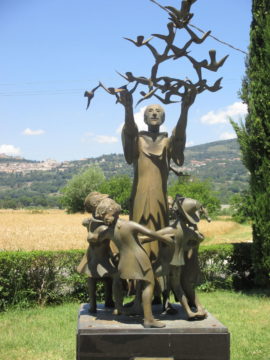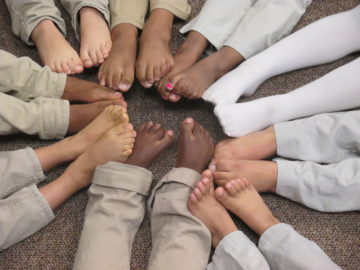Franciscan Sister of Christian Charity Sister Kathleen Murphy reflects on Pope Francis’ prayer intention of the month and comments on the United States Conference of Catholic Bishops’ pastoral letter on racism, Open Wide Our Hearts: The Enduring Call to Love .
“…the Gospel of Jesus Christ is the greatest justice which can be offered to the heart of humanity, which has a vital need for it, even if it does not realize it.” Pope Francis, March 11, 2020 If we have not yet perceived the desperate need for Gospel values in our world, then Pope Francis’ words will surely make this clear. The justice of Jesus enters into every issue, every corner of the Earth and every human need. Knowing this call verbalized by the Holy Father, we enter into another year of articles meant to explore matters that Pope Francis asks us to bring to prayer as well as considering the United States Conference of Catholic Bishops’ pastoral letter on racism entitled Open Wide Our Hearts: The Enduring Call to Love. So, let us begin. This month’s intention is “That the planet’s resources will not be plundered, but shared in a just and respectful manner.”

In Laudato Si, Pope Francis reflects on St. Francis’ practice of addressing each element of Creation as “Brother” and “Sister”. He writes, “Such a conviction cannot be written off as naive romanticism, for it affects the choices which determine our behavior. If we approach nature and the environment without this openness to awe and wonder, if we no longer speak the language of fraternity and beauty in our relationship with the world, our attitude will be that of masters, consumers, ruthless exploiters…By contrast, if we feel intimately united with all that exists, then sobriety and care will well up spontaneously. The poverty and austerity of Saint Francis were no mere veneer of asceticism, but something much more radical: a refusal to turn reality into an object simply to be used and controlled.”
We do well to go one step further and to understand our own view of Creation with all its resources as a collective “thing” to be possessed, manipulated and hoarded for our own national affluence. It is in this attitude that global troubles are often sourced.
Share The World’s Resources – an advocacy organization with consultative status at the Economic and Social Council of the United Nations wrote in its report in 2010, “The incidence of hunger is more widespread than ever before in human history, surpassing 1 billion people in 2009 despite the record harvests of food being reaped in recent years. At least 1.4 billion people live in extreme poverty, a number equivalent to more than four times the population of the United States. One out of every five people does not have access to clean drinking water. More than a billion people lack access to basic health care services, while over a billion people – the majority of them women – lack a basic education. Every week, more than 115,000 people move into a slum somewhere in Africa, Asia or Latin America. Every day, around 50,000 people die needlessly as a result of being denied the essentials of life.” These are tragic statistics that surely give us pause, and one can only assume that they have only worsened over the last 10 years. Why do these shameful facts remain? It seems that Robert Fulgham had it right when he wrote All I Really Need to Know, I Learned in Kindergarten. First on his list of things to know is “Share everything.” Too often the “haves” are not interested in this most basic activity of sharing with the “have nots”. Nations and their citizens give greater priority to progressing in wealth and comfort than in making sure that their neighbor has what is needed. Pope Francis is asking us to pray that our resources, all resources, be shared in a just and respectful manner. Returning to the Share the World’s Resources report, we read, “Sharing is a simple solution to complex problems that reflects the moral values and ethics that should underpin the fabric of society. Everyone understands and practices sharing within their family or community. By relating the principle of sharing to social and economic policy, it simplifies and brings to life important global issues and complex economic thinking in a way that anyone can relate to.”
This same perception of ourselves as masters, consumers, ruthless exploiters, enters into the issue of racism. As the U.S. Bishops write in their pastoral letter, Open Wide Our Hearts, “Racism arises when a person holds that his or her own race or ethnicity is superior, and there judges persons of other races or ethnicities as inferior and unworthy of equal regard.” When we begin to perceive ourselves in these roles, then naturally, the master must have a servant, the consumer must have a provider, the exploiter stands upon someone who is exploited. If we are in these overbearing roles, how is that sharing? How is that practicing charity? Pope Francis writes again in Laudato Si, “The created things of this world are not free of ownership: “For they are yours, O Lord, who love the living” (Wis 11:26). This is the basis of our conviction that, as part of the universe, called into being by one Father, all of us are linked by unseen bonds and together form a kind of universal family, a sublime communion which fills us with a sacred, affectionate and humble respect. Here I would reiterate that “God has joined us so closely to the world around us that we can feel the desertification of the soil almost as a physical ailment, and the extinction of a species as a painful disfigurement”.
So, let us write to our legislators with the foundational plea that we become a nation of “sharers”. Let us pray for all leaders of the world that they be guided by a spirit of justice. Let us pray that we will feel the pain of Mother Earth and of her children who suffer. Let us pray!


